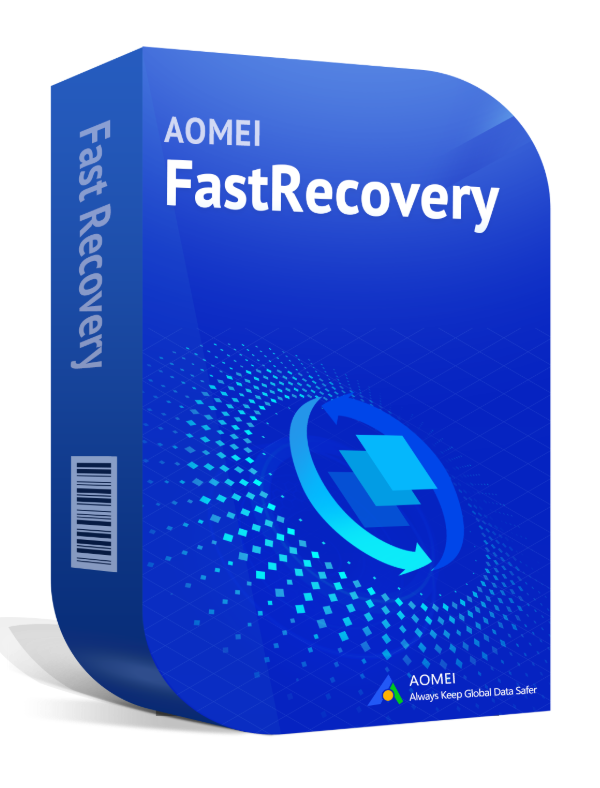Hard Drive Recovery: Recover Data From Clicking Hard Drive
Do you want to recover data from clicking hard drive? Here you are in the right place. We prepare a reliable tool for clicking hard drive recovery in the following part.
My external hard drive is making a clicking noise, it is about 2 years old. The drive is not recognized in Disk Management utility, but it shows up as BUP Slim in connected storage. Is it possible to recover the data?
Does your hard drive emit repetitive clicking sounds when you try to transfer files? These clicks often signify corruption or impending failure. The familiar tick-tick noises resemble a high-speed drill or a rapidly spinning washer.
Don't wait for the inevitable data loss—take control of the situation and proactively back up your data from the clicking hard drive. Even if you're already experiencing data loss due to corruption or file disappearance, don't worry, we have you covered. This article will delve into the causes of hard drive clicking and provide you with the best practices to successfully recover data from clicking hard drive.
Recovering data from a clicking hard drive: 2 ways
There are two primary techniques to hard drive recovery from clicking sound. Regardless of the method chosen, time is of the essence when dealing with a clicking HDD. Cease using the hard drive immediately to maximize your chances of data retrieval.How can we recover data from hard disk effectively? Refer to the following 2 ways here.
Way 1. Recover data from a clicking hard drive using AOMEI FastRecovery
Utilizing data recovery software is the most efficient and straightforward method for clicking hard drive data recovery.For this, we provide a data recovery tool with many outstanding advantages - AOMEI FastRecovery. It can help you to recover data from a clicking hard drive or recover data from clicking an external hard drive easily.

- Available in all Windows operating systems like Windows 11/10/8/7 and Windows Server.
- Both Quick Scan and Deep Scan are supported to recover lost data or deleted data from HDD.
- More than 200 types of files can be recovered: Word documents, Excel, PPT, JPG, GIF, 3FR, MP3, MP4, MOV, VWM, ANI, ZIP, etc.
- You can filter, search, and preview deleted files during the recovery process.
- You can effortlessly follow the simple steps and retrieve your files with confidence.
Let’s see how to recover data from a clicking drive to ensure data safety with a few clicks.
1. Run AOMEI FastRecovery, and hover the mouse over your clicking hard drive. Click Scan to scan the hard drive.
2. Your clicking hard drive will be scanned automatically. You can find your data quickly according to Document, Type, Name, Path, or Date.
- Size: You can filter the file size (<128KB, 128KB~1MB, 1MB~ 512MB, etc) according toyour needs.
- Name: Input the filenames of your files to search for them.
- Date modified: Set the date (today, yesterday, last 7/30 days, and so on)to narrow the search area and locate them faster.
3. Find and choose the files you need to recover from the clicking hard drive. Then click Recover x files to restore hard drive. Select a path on your computer to save recovered data.
Way 2. Engage a data recovery service for click-of-death hard drive recovery
If you suspect significant damage to your clicking hard drive, it's advisable to consult a data recovery service center. Experts in these centers employ specialized tools to open your clicking hard drive and repair the hard drive head. Moreover, data recovery service centers maintain clean room environments free from debris and air pollutants to preserve the integrity of your clicking hard drive.
Way 3. Check hard drive connection
- Check if the connection cable is damaged.
- Check if the power cable is loose. You can connect the clicking hard drive to the computer by unplugging and reconnecting the power cable.
- If the clicking sound is coming from an external hard drive, you should check if the connection cable is compatible. For example, you can use a USB 2.0 cable to connect a USB 3.0 external hard drive.
Way 4. Connect the clicking hard drive to another computer
You can try connecting the Click hard drive to another computer. If the Click is an internal hard drive, you can use an adapter to connect it to your computer as an external hard drive.
Way 5. Freeze the clicking hard drive
When your hard drive is overheating, it can make a clicking noise. So, you can try to stop the hard drive that is crashing. Stop using your computer and clean the fans. Especially in summer, you can add fans to cool the hard drive. Once the hard drive is working again, you should immediately copy your data.
Symptoms of a clicking hard drive
Before performing an HDD data recovery, not sure if the clicking noises are abnormal? Look out for these common signs that confirm your suspicions:
- Click Amplitude: If the clicks you hear are distinct and reminiscent of screeching metal-on-metal, exercise caution. Moreover, if the clicking sound is so loud that it interrupts a conversation, there's definitely a problem.
- Boot Impact: When your hard drive clicks and fails to boot, it indicates a malfunctioning hard drive. Pay attention if you notice a clicking noise during startup and take immediate action.
- Click Frequency: A high-frequency clicking noise from your hard drive, with numerous clicks occurring in a short interval, is a clear problem.
Apart from the audible clicking aspect, here are some other symptoms that may indicate the infamous click of death:
- Sudden drops in file transfer speeds: If you observe a sudden and sharp decline in your file transfer speeds, it's likely that your hard drive is on the verge of corruption.
- Long boot times: If your laptop or PC takes an unusually long time to boot, it could be an early indicator of the click of death.
Causes of clicking hard drives
What triggers that monotonous, high-pitched clicking noise from hard drives?
- Physical Damage: Dropping an external hard drive or exposing it to extreme temperatures can cause damage. Sometimes, a significant impact can misalign the read-write actuator, resulting in an undesirable clicking noise.
- Wear and Tear: Every hard drive has a limit on its read and write cycles. If your hard drive is quite old, clicking noises indicate aging and an eventual failure.
- Static Friction (Stiction): Occasionally, the HDD head gets stuck to the disk platter, impacting the spindle motor spin and creating a clicking noise.
- Electrical Issues: Faulty power connections can cause sudden electrical surges that affect your hard drive. In some cases, the circuit board of your hard drive may get damaged.
- Printed Circuit Board (PCB) Malfunction: PCBs are vital components of a hard drive. Unfortunately, they can malfunction over time, resulting in a noisy hard drive.
Tips for clicking hard drive recovery
Before performing a clicking hard drive recovery, you need to notice some tips to protect your hard drive data.
Dos
- Immediately cease all usage of the hard drive. If it's an internal HDD, stop using your PC or laptop. If it's an external HDD, limit its usage. Continued use can worsen the clicking noise and potentially damage the hard drive, rendering data recovery impossible.
- Select a reliable data recovery application. These tools scan your hard drive for recoverable data, significantly increasing your chances of successful data retrieval. Ensure you choose the right tool for optimal results.
- Consult a reputable data recovery service center. If you're dealing with a heavily damaged HDD or the DIY techniques mentioned in this article don't work, or if your HDD is severely damaged, it's best to conduct thorough research and seek assistance from a cost-effective and reliable data recovery service center. If your PC fails to detect your external hard disk, visiting a data recovery center is highly recommended.
Don'ts
- Avoid knocking on the drive. It can cause further damage.
- Do not place the hard drive in a freezer. While it may be argued that overheating causes the clicking noise, please do not allow hard drives to return to previous temperatures
- Avoid attempting to open the drive. Opening a hard drive is a complex procedure best left to industry professionals who work in clean room environments. Additionally, do not try to transplant the HDD head, as technological advancements have made this impractical, and attempting it could damage the disk.
Is DIY Clicking Hard Drive Repair Feasible?
Yes, it's possible to repair a clicking hard drive if you have the expertise and experience in dealing with malfunctioning hard drives.
However, attempting a Do-It-Yourself (DIY) approach carries risks, as you may inadvertently cause further damage to the hard drive. Some DIY methods require advanced technical knowledge.
Here are some basic troubleshooting steps you can attempt to fix a clicking hard drive:
- Check the connecting cable: For an external HDD, inspect the connecting cable for any signs of damage. If suspected, try reconnecting the HDD using a new cable.
- Inspect the power cable: For internal HDDs, verify if the power cable is securely connected. Try unplugging and replugging the power cable to the HDD, and then connect it to your PC.
- Ensure drive-cable compatibility: Insufficient power can lead to random clicking noises if you try to connect a USB 3.0 external HDD using a USB 2.0 cable.
If the above preliminary troubleshooting tips fail to resolve the issue, you could explore a DIY approach involving manual manipulation of the hard disk head.
FAQs about clicking hard drive
✍ Can I fix a clicking hard drive on my own?
Attempting DIY repairs on a clicking hard drive is not recommended. Hard drives are delicate and complex devices, and improper handling can worsen the damage. It's best to seek professional data recovery services to minimize the risk of permanent data loss.
✍ Can data be recovered from a clicking hard drive?
Data recovery from a clicking hard drive is possible, but it requires specialized equipment and expertise. Professional data recovery services employ advanced techniques to retrieve data from faulty drives, even in cases of mechanical failure.
✍ Is there any way to prevent hard drive clicking?
While hard drive failures can occur unexpectedly, taking preventive measures can help minimize the risk. Regularly backing up your data, maintaining proper cooling and ventilation for your system, and avoiding physical shocks or drops can extend the lifespan of your hard drive.
Conclusion
When you hear your hard drive making clicking noises, it's a clear indication of potential HDD corruption and impending failure. It's crucial to cease using the hard drive and take immediate action to create a backup and recover your data using reliable file recovery software. Remember, your data is invaluable, so it's essential to prioritize its protection when dealing with a clicking hard drive situation.


